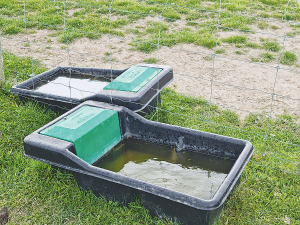More detail needed on Three Waters
The Government needs to give more detail on its Three Waters policy reset.
 Rural water schemes, which primarily provide water for agricultural purposes, may be able to be directly owned and operated by their users.
Rural water schemes, which primarily provide water for agricultural purposes, may be able to be directly owned and operated by their users.
Rural water schemes, which primarily provide water for agricultural purposes, may be able to be directly owned and operated by their users.
This would make them independent of one of the four big Water Services Entities (WSEs) that are proposed to take over running all the country’s water services under the Government’s controversial Three Waters Reforms.
Hamiora Bowkett, executive director of Three Waters Reform at the Department of Internal Affairs, says the recommendation to carve out rural mixed-use water schemes was made by the Rural Supplies Technical Working Group earlier this year. This recommendation has now gained government approval.
“This will require 75% of all users (farming and domestic) to agree to the proposal, and for the proposal to be informed by a robust assessment of factors associated with a scheme’s independent operation.”
Meanwhile, Bowkett says DIA officials, Clutha District Council and farmer representatives have agreed to establish a joint governance group to explore the costs, benefits and risks with user ownership versus WSE ownership of Clutha’s mixed use water schemes.
“DIA intends developing a sound methodology for the assessment of ownership options for mixed-use rural schemes that can be applied to schemes in other parts of New Zealand.”
Bowkett says this will then be used to inform the legislative mechanisms to be provided for in the second Water Services Entities Bill, expected to be introduced later this year.
The Meat Industry Association of New Zealand (MIA) today announced that Chief Executive Officer Sirma Karapeeva has resigned from the role.
The winners of the 2026 Hawke’s Bay/Wairarapa Dairy Industry Awards were announced at the annual awards dinner held at Copthorne Solway Park in Masterton on Thursday evening.
Environment Southland is welcoming this week’s decision by the Environmental Protection Authority (EPA) to approve the release of Blaptea elguetai, a leaf‑feeding beetle that will help control the highly invasive Chilean flame creeper.
This March, the potato industry is proudly celebrating International Women’s Day on 8 March alongside the International Year of the Woman Farmer, recognising the vital role women play across every part of the sector — from paddocks and packhouses to research, leadership, and innovation.
Fruit trader Seeka posted a record profit and returns to shareholders in 2025.
Recent weather events in the Bay of Plenty, Gisborne/Tairawhiti, and Canterbury have been declared a medium-scale adverse event.

OPINION: A mate of yours truly reckons rural Manawatu families are the latest to suffer under what he calls the…
OPINION: If old Winston Peters thinks building trade relations with new nations, such as India, isn't a necessary investment in…